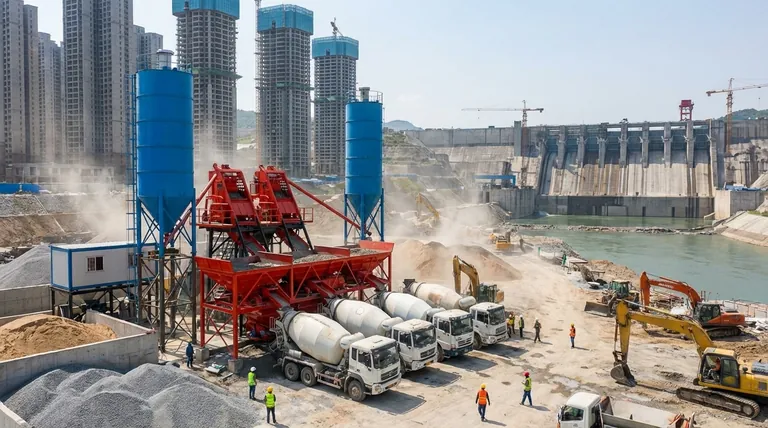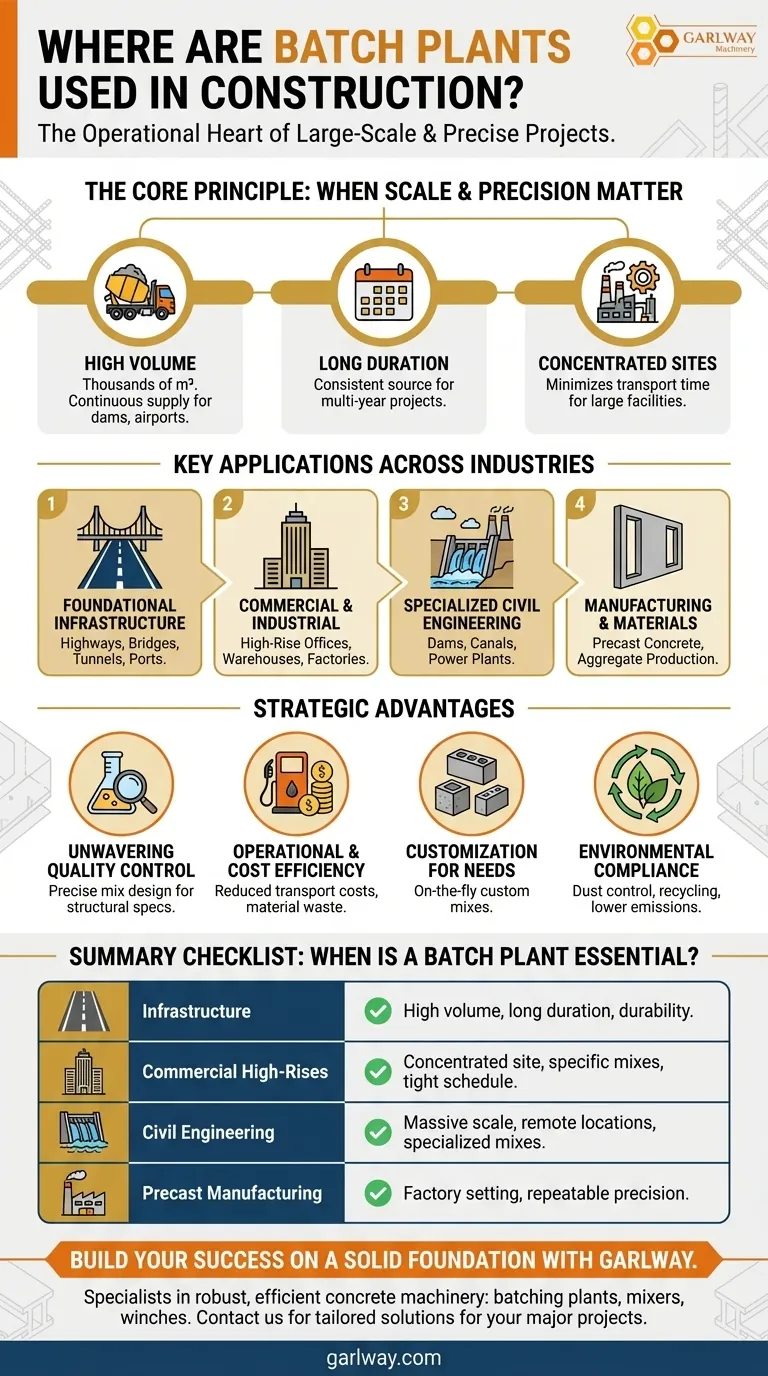Batch plants are the operational heart of virtually every major construction project, from towering skyscrapers and expansive bridges to industrial facilities and critical infrastructure. They are deployed wherever there is a need for large quantities of precisely engineered concrete, serving as the on-demand source for foundations, structural elements, and massive paving operations.
The decision to use a concrete batch plant is driven by a project's demand for scale, precision, and efficiency. They become essential when a project requires high volumes of consistent, quality-controlled concrete that cannot be economically or logistically met by external suppliers.

The Core Principle: When Scale and Precision Matter
A batch plant is more than just a piece of equipment; it's a strategic asset. Its use is justified by three primary project characteristics.
Projects with High Concrete Volume
Batch plants are indispensable for jobs requiring a massive and continuous supply of concrete. Think of dam construction, airport runways, or the foundations for a power plant.
These projects consume thousands of cubic meters of concrete, and a dedicated plant ensures production can keep pace with demand without interruption.
Projects with Long Durations
For projects that span many months or even years, an on-site or nearby batch plant provides a consistent, reliable source of material.
This eliminates the logistical complexities and potential quality variations that come from sourcing concrete from multiple suppliers over a long period.
Projects with Concentrated Work Sites
Efficiency is gained by locating the concrete production source as close as possible to the point of use.
This is critical for large, contained sites like industrial complexes or water treatment facilities. It minimizes transport time, reduces fuel costs, and ensures the concrete arrives with the optimal consistency for pouring.
Key Applications Across Industries
The versatility of batch plants allows them to serve a wide range of construction and industrial sectors.
Foundational Infrastructure
This is the most common application. Projects like highways, bridges, tunnels, and ports rely on batch plants to produce the durable, high-strength concrete required to withstand heavy use and environmental stress for decades.
Commercial and Industrial Construction
Large-scale building projects, including high-rise offices, warehouses, factories, and residential towers, require a dedicated concrete supply for everything from deep foundations and support columns to extensive floor slabs.
Specialized Civil Engineering
Massive civil works such as dams, canals, and electric power plants are defined by their enormous concrete requirements. A high-capacity batch plant is fundamental to the feasibility of these undertakings.
Manufacturing and Material Production
Beyond direct construction, batch plants are the core of operations for precast concrete manufacturers. They produce standardized elements like wall panels, pipes, and beams with factory-level precision and consistency.
They are also used in aggregate production, mining operations, and the creation of dry-mix mortar, showcasing their role in the broader materials supply chain.
Understanding the Strategic Advantages
Choosing to deploy a batch plant provides critical advantages that directly impact a project's success. This control over production is a key reason they are so widely used.
Unwavering Quality Control
A dedicated plant gives engineers absolute authority over the concrete mix design. They can precisely control the water-to-cement ratio, aggregate types, and chemical admixtures to meet exact structural specifications. This guarantees consistency from the first pour to the last.
Operational and Cost Efficiency
Producing concrete on-site or nearby dramatically reduces transportation costs and material waste. By mixing only what is needed, projects can achieve significant cost savings and better manage their budgets.
Customization for Specific Needs
Construction projects often require different types of concrete for different applications. A batch plant allows for the on-the-fly creation of customized mixes—a high-strength mix for a support column followed by a more workable mix for a floor slab.
Environmental Compliance
Modern batch plants are designed to minimize their environmental impact. They offer superior dust control, reduce emissions, and allow for the recycling of water and unused materials, helping projects meet stringent regulatory standards.
Making the Right Choice for Your Project
The need for a batch plant is a direct function of your project's goals for scale, quality, and logistical control.
- If your primary focus is a large-scale infrastructure project (e.g., a highway or dam): A dedicated batch plant is non-negotiable to meet the immense volume and consistency requirements.
- If your primary focus is a high-rise commercial building: An on-site or nearby plant is crucial for maintaining a tight schedule and ensuring structural integrity with specific concrete mixes.
- If your primary focus is precast element manufacturing: A stationary batch plant is the core of your operation, providing the repeatable precision needed for factory production.
- If your primary focus is a smaller residential or commercial job: Relying on a third-party ready-mix supplier is almost always more cost-effective than deploying a dedicated plant.
Ultimately, deploying a batch plant is a strategic decision to control the most critical material on your site, ensuring your project is built on a foundation of quality and efficiency.
Summary Table:
| Project Type | Key Characteristics | Why a Batch Plant is Essential |
|---|---|---|
| Infrastructure (Highways, Bridges) | High volume, long duration, durability requirements | Ensures continuous supply of high-strength, consistent concrete. |
| Commercial High-Rises | Concentrated site, specific mix designs, tight schedule | Provides on-site control for foundations, columns, and slabs. |
| Civil Engineering (Dams, Power Plants) | Massive scale, specialized mixes, remote locations | Fundamental for feasibility and meeting enormous material demands. |
| Precast Manufacturing | Factory setting, repeatable precision, quality control | Core equipment for producing standardized elements efficiently. |
Ready to ensure your next major project has a reliable, high-quality concrete supply?
At GARLWAY, we specialize in providing robust and efficient construction machinery, including concrete batching plants, concrete mixers, and winches, tailored for construction companies and contractors worldwide. Our solutions deliver the unwavering quality control, operational efficiency, and customization your large-scale projects demand.
Let's build your success on a solid foundation. Contact our experts today to discuss the perfect batching plant solution for your specific needs!
Visual Guide

Related Products
- HZS35 Small Cement Concrete Mixing Batch Plant
- JW1000 Mobile Cement Mixer Concrete Mixer Truck and Batching Plant
- HZS120 Ready Mix Concrete Batching Plant Commercial Mud Cement Mixer
- HZS75 Concrete Batching Plant Cement Mixer Price Concrete Mixer Bunnings Mixing Plant
- HZS180 Ready Mix Concrete Plant for Foundations with Sand and Cement
People Also Ask
- How are the roads within a concrete mixing station typically designed? Optimize for Safety and Efficiency
- What are the factors influencing choice of a concrete mixing plant? Key Considerations for Efficiency
- How can the discharging stage be optimized to improve overall concrete mixing efficiency? Fix the Mixer-to-Vehicle Handoff Bottleneck
- How does a small cement mixer save money? Boost Efficiency & Reduce Labor Costs
- What are the factors to be considered when designing a concrete mixture? Master the Balance for Strength & Workability
















